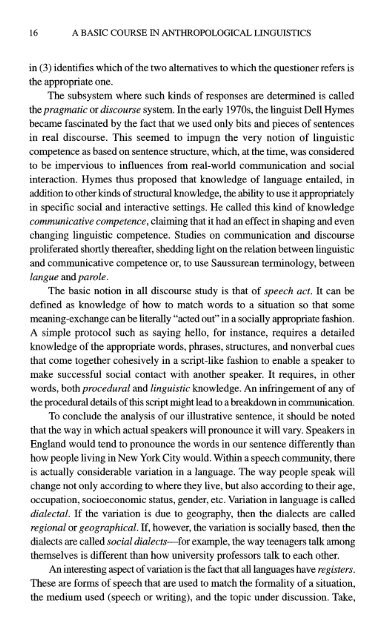A Basic Course in Anthropological Linguistics (Studies in Linguistic ...
A Basic Course in Anthropological Linguistics (Studies in Linguistic ...
A Basic Course in Anthropological Linguistics (Studies in Linguistic ...
You also want an ePaper? Increase the reach of your titles
YUMPU automatically turns print PDFs into web optimized ePapers that Google loves.
16 A BASIC COURSE IN ANTHROPOLOGICAL LINGUISTICS<br />
<strong>in</strong> (3) identifies which of the two alternatives to which the questioner refers is<br />
the appropriate one.<br />
The subsystem where such k<strong>in</strong>ds of responses are determ<strong>in</strong>ed is called<br />
the pragmatic or discourse system. In the early 1970s, the l<strong>in</strong>guist Dell Hymes<br />
became fasc<strong>in</strong>ated by the fact that we used only bits and pieces of sentences<br />
<strong>in</strong> real discourse. This seemed to impugn the very notion of l<strong>in</strong>guistic<br />
competence as based on sentence structure, which, at the time, was considered<br />
to be impervious to <strong>in</strong>fluences from real-world communication and social<br />
<strong>in</strong>teraction. Hymes thus proposed that knowledge of language entailed, <strong>in</strong><br />
addition to other k<strong>in</strong>ds of structural knowledge, the ability to use it appropriately<br />
<strong>in</strong> specific social and <strong>in</strong>teractive sett<strong>in</strong>gs. He called this k<strong>in</strong>d of knowledge<br />
communicative competence, claim<strong>in</strong>g that it had an effect <strong>in</strong> shap<strong>in</strong>g and even<br />
chang<strong>in</strong>g l<strong>in</strong>guistic competence. <strong>Studies</strong> on communication and discourse<br />
prohferated shortly thereafter, shedd<strong>in</strong>g light on the relation between l<strong>in</strong>guistic<br />
and communicative competence or, to use Saussurean term<strong>in</strong>ology, between<br />
langue and parole.<br />
The basic notion <strong>in</strong> all discourse study is that of speech act. It can be<br />
def<strong>in</strong>ed as knowledge of how to match words to a situation so that some<br />
mean<strong>in</strong>g-exchange can be literally “acted out” <strong>in</strong> a socially appropriate fashion.<br />
A simple protocol such as say<strong>in</strong>g hello, for <strong>in</strong>stance, requires a detailed<br />
knowledge of the appropriate words, phrases, structures, and nonverbal cues<br />
that come together cohesively <strong>in</strong> a script-like fashion to enable a speaker to<br />
make successful social contact with another speaker. It requires, <strong>in</strong> other<br />
words, both procedural and l<strong>in</strong>guistic knowledge. An <strong>in</strong>fr<strong>in</strong>gement of any of<br />
the procedural details of this script might lead to a breakdown <strong>in</strong> communication.<br />
To conclude the analysis of our illustrative sentence, it should be noted<br />
that the way <strong>in</strong> which actual speakers will pronounce it will vary. Speakers <strong>in</strong><br />
England would tend to pronounce the words <strong>in</strong> our sentence differently than<br />
how people liv<strong>in</strong>g <strong>in</strong> New York City would. With<strong>in</strong> a speech community, there<br />
is actually considerable variation <strong>in</strong> a language. The way people speak will<br />
change not only accord<strong>in</strong>g to where they live, but also accord<strong>in</strong>g to their age,<br />
occupation, socioeconomic status, gender, etc. Variation <strong>in</strong> language is called<br />
dialectal. If the variation is due to geography, then the dialects are called<br />
regional or geographical. If, however, the variation is socially based, then the<br />
dialects are called social dialects-for example, the way teenagers talk among<br />
themselves is different than how university professors talk to each other.<br />
An <strong>in</strong>terest<strong>in</strong>g aspect of variation is the fact that all languages have registers.<br />
These are forms of speech that are used to match the formality of a situation,<br />
the medium used (speech or writ<strong>in</strong>g), and the topic under discussion. Take,






